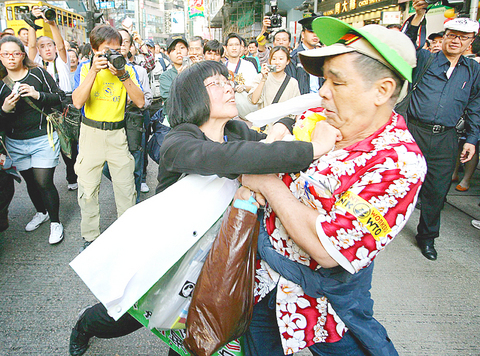Tens of thousands of demonstrators took to the streets of Hong Kong yesterday, demanding the full democracy that was promised when Britain handed its crown-jewel colony back to China eight years ago.
Frustrated with the limited reforms proposed by the city's Beijing-appointed leader, Chief Executive Donald Tsang (
Organizers said on about 250,000 people, with many clad in black, took part in the march -- much higher than analysts' estimate of between 50,000 to 100,000. But police said they counted only 40,000 people when the march began in Hong Kong's Victoria Park.

PHOTO: EPA
The protesters, urged to dress in black for the event, chanted slogans as they left the park, brandishing banners denouncing an unpopular government bill to change the city's electoral system.
At the head of the procession marchers carried a huge black banner emblazoned with the protest's birdcage emblem, a symbol of the political constraints activists feel the city endures.
Tsang's proposals would double the size of the 800-strong committee of Beijing-backed elites that chooses the city's chief executive, and would also enlarge the 60-seat legislature.
But democrats say the proposals do not go far enough, and would amount to a step backward for the full democracy spelled out under the Hong Kong constitution, known as the Basic Law.
The provision gives no timeline for when it might be achieved. Democrats in the parliament, known as the Legislative Council, say they will veto the legislation unless Tsang offers a timetable for democratic reform.
"This is make-or-break time," said the pro-democracy movement's veteran leader Martin Lee (
"The governments [of Hong Kong and China] in the past week have done everything they can to keep the numbers down," Lee said.
A massive turnout could weaken Tsang's political base and rattle Communist Party leaders in China, who fear reform here might weaken the city's economy and spark calls from change on the mainland.
More than half a million people flooded the streets of Hong Kong in July 2003, forcing the withdrawal of an unpopular anti-subversion law proposal and contributing to the resignation of former leader Tung Chee-hwa this past March.
Among the marchers yesterday was political heavyweight Anson Chan (陳方安生), the former deputy leader who even in retirement remains hugely popular.
"I feel there's a need to fight for democracy," Chan said, sharing her political thoughts with reporters for the first time.
"Everyone has a right to protest," she added, denying her decision to go public was a precursor to launching a new career in politics.
Before yesterday's march kicked off, local Catholic leader Bishop Joseph Zen (陳日君) led a prayer service during which he called on Hong Kong to heed the call for democracy.

Conflict with Taiwan could leave China with “massive economic disruption, catastrophic military losses, significant social unrest, and devastating sanctions,” a US think tank said in a report released on Monday. The German Marshall Fund released a report titled If China Attacks Taiwan: The Consequences for China of “Minor Conflict” and “Major War” Scenarios. The report details the “massive” economic, military, social and international costs to China in the event of a minor conflict or major war with Taiwan, estimating that the Chinese People’s Liberation Army (PLA) could sustain losses of more than half of its active-duty ground forces, including 100,000 troops. Understanding Chinese

The Ministry of Foreign Affairs (MOFA) yesterday said it is closely monitoring developments in Venezuela, and would continue to cooperate with democratic allies and work together for regional and global security, stability, and prosperity. The remarks came after the US on Saturday launched a series of airstrikes in Venezuela and kidnapped Venezuelan President Nicolas Maduro, who was later flown to New York along with his wife. The pair face US charges related to drug trafficking and alleged cooperation with gangs designated as terrorist organizations. Maduro has denied the allegations. The ministry said that it is closely monitoring the political and economic situation

UNRELENTING: China attempted cyberattacks on Taiwan’s critical infrastructure 2.63 million times per day last year, up from 1.23 million in 2023, the NSB said China’s cyberarmy has long engaged in cyberattacks against Taiwan’s critical infrastructure, employing diverse and evolving tactics, the National Security Bureau (NSB) said yesterday, adding that cyberattacks on critical energy infrastructure last year increased 10-fold compared with the previous year. The NSB yesterday released a report titled Analysis on China’s Cyber Threats to Taiwan’s Critical Infrastructure in 2025, outlining the number of cyberattacks, major tactics and hacker groups. Taiwan’s national intelligence community identified a large number of cybersecurity incidents last year, the bureau said in a statement. China’s cyberarmy last year launched an average of 2.63 million intrusion attempts per day targeting Taiwan’s critical

‘SLICING METHOD’: In the event of a blockade, the China Coast Guard would intercept Taiwanese ships while its navy would seek to deter foreign intervention China’s military drills around Taiwan this week signaled potential strategies to cut the nation off from energy supplies and foreign military assistance, a US think tank report said. The Chinese People’s Liberation Army (PLA) conducted what it called “Justice Mission 2025” exercises from Monday to Tuesday in five maritime zones and airspace around Taiwan, calling them a warning to “Taiwanese independence” forces. In a report released on Wednesday, the Institute for the Study of War said the exercises effectively simulated blocking shipping routes to major port cities, including Kaohsiung, Keelung and Hualien. Taiwan would be highly vulnerable under such a blockade, because it